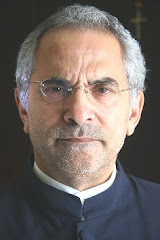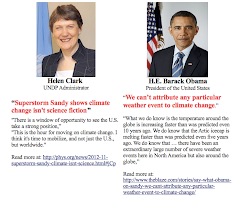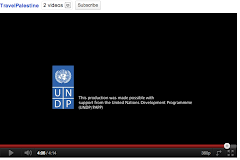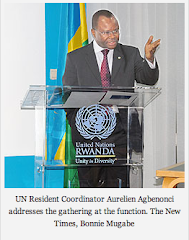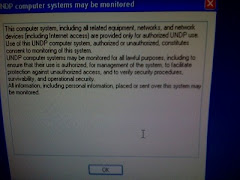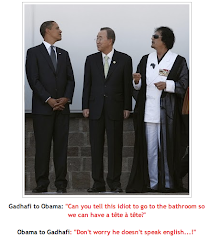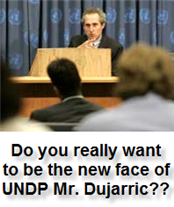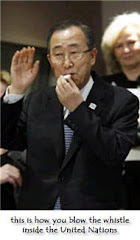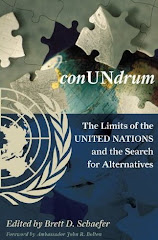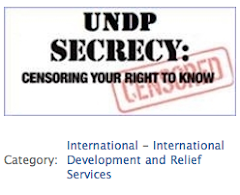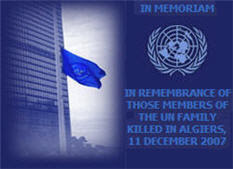CUT CUT CUT CUT
UN STAFF
NOW
Ambassador Joseph M Torsella
U.S. Representative for UN Management and Reform
U.S. Mission to the United Nations
New York, NY
September 29, 2011
AS DELIVERED
Thank you, Mr. Chairman.
Mr. Chairman, congratulations to you on your election as Chairman of the Bureau, and to other members of the bureau. We are grateful for your service, and also thank Under-Secretary-General Angela Kane and her staff, who have produced the budget documents we will consider in this Committee. We look forward to working constructively with you, the Bureau and other Member States to ensure a successful outcome this session.
And we enthusiastically support your call, Mr. Chairman, for working more effectively here in the Fifth Committee. As the General Assembly body in charge of UN management and administration, the Fifth Committee should itself model the management behavior we expect from the rest of the United Nations. We sometimes cloak our discussions here in code words and diplomatic euphemisms, but in keeping with your call this morning for a new approach to our work, I would like to offer today, on behalf of the United States, some very frank and plainspoken observations on the 2012-13 budget proposal.
We meet at a time of severe – and worldwide – economic challenge. The General Debate that has just concluded made it clear: Member States around the world are under financial strain. This is not a phenomenon of one or even several donor nations, but a global reality, north and south, east and west. From Asia to Europe, from Africa to Latin America and North America, heads of state spoke of the enduring impact of the global financial crisis. That crisis has made financial resources ever more scarce, made efficient outcomes ever more important, and made leaders – including every one of us in this room today – ever more accountable to the citizens we represent for the fiscal decisions we make.
No one has said this better or more clearly than Executive Director of UN AIDS Director Michel Sidibè. “All indicators suggest,” Director Sidibe said in a recent presentation, “that key donor countries already experiencing public deficits will continue to face a serious, prolonged fiscal deficit in the near future. It is a mistake,” he continued, “to interpret this as AIDS fatigue. The world is not turning its back on AIDS. It is turning its back on business as usual.”
That is the simple reality we face, all of us: in a time of scarce resources, the United Nations cannot afford business as usual. But that, unfortunately, is exactly what is represented in too much of the budget submitted to us.
To be sure, there are some very positive steps in this budget. When the Secretary General called in February for managers to cut 3% or more from their budget outlines, we applauded. And the United States still supports and welcomes his determined efforts to trim the UN budget and his strong leadership in calling for change in the organization. But what this budget document makes clear is that not all of the organization has risen to the challenge set by the Secretary General. The Secretary General has done his part, but not all of the rest of us have.
First, let’s be clear. A reduction in planned expenses – from budget outline to budget proposal – is not what any family, government or business around the world would recognize as a real belt-tightening “cut.” It is simply loosening our belt a little less than we originally planned. So the relevant measure of our fiscal discipline is whether we will actually spend less in 2012-13 than we did in 2010-11. And this budget fails that test.
There are some cuts around the edges, for example, in conference services, the abolition of some vacant posts, and providing summary records to Member States. These are historic firsts, and we wholeheartedly support those initiatives. But there are too few economy measures in this budget that are entirely realistic, financially meaningful, and clearly sustainable. Of the 37 budget sections before the Committee, reductions are proposed for 18…but 19 either increase (15) or remain unchanged (4). The key driver of costs for future years, in any organization, is personnel. Yet this budget proposes abolishing just 44 net posts from the organization’s 10,307 person workforce. That represents a 0.4% decrease – less than one percent – from current employee levels.
And the onslaught of add-ons which will inevitably be presented during the session – potentially $6 million for Information Communication Technology, $9 million for Administration of Justice, $4 million for the Strategic Heritage Plan renovations in Geneva – as well as the program budget implications emanating from the Economic and Social session in July, a preliminary re-costing estimate of $147 million, and 15 reports still to be considered, could result in an alarming total 2012-13 budget of $5.5 billion.
Considered against the current 2010-11 biennial total of $5.367 billion, that is not a cut. That is in fact a more than 2 percent increase and this does not take into account potential add-ons in the second year of the budget. That does not represent a break from “business as usual,” but rather a continuation of it.
For a decade now, the United Nations regular budget has grown dramatically, relentlessly, and exponentially: from $2.6 billion in 2001-2002, to $5.4 billion in 2010-2011. This growth has significantly outpaced the growth of the budgets of almost all the Member States that comprise the UN. I am not drawing a comparison between the United Nations and the United States, but between the United Nations and the rest of the world.
It’s true that some of this growth can be justified by new mandates that we all proudly support. But it’s also true that those mandates do not account for the disturbingly persistent ten-year trend of increases in the UN budget.
We commonly hear that Special Political Missions are the main reason for the UN’s budget growth. But there are two key points to remember. First, SPMs are – by definition – non-permanent expenses. They may influence the picture for several years at a time, but they do not have the same long-term, structural impact on the UN’s cost structure as, for example, regular budget posts.
Second, SPMs are only part of the story on the cost side of the UN budget. If we consider the budget without SPMs, we see this clearly: it still shows dramatic increases, from $2.4 billion in 2000-2001 to $4.2 billion in 2010-2011. That’s a 75 percent increase – a rate that far outpaces budget increases again in most of the Member States of the UN and at a time when many Member States are cutting entire departments and ministries.
So what is behind this trend? Several budget lines deserve our attention this session: general operating expenses, travel of staff, and grants and contributions have all have played a role, and should be intensely scrutinized. But as I noted earlier, in any organization, it is personnel that is the largest and most important driver of long-term costs, and the UN is no exception: posts accounted for $2.4 billion in costs in 2010-11, a huge increase from ten years ago, when the total costs was a full $1 billion less ($1.4 billion in 2000 - 2001). When we look deeper, we see two troubling facts behind this increase. First, the number of posts themselves has increased, from 8,989 in 2000-2001 to 10,307 in 2010-2011. But second, the cost of UN posts – the total compensation to employees – has grown by 70 percent while the number of posts has grown by only 15 percent.
Focus for a moment on just one figure: according to the proposed budget, the average total compensation for a UN staff member – simply taking the total proposed cost of posts divided by the total number of posts, not including General Temporary Assistance positions – is $238,000 biannually. No number underscores Chairman Monthe’s point more than this one. Instead of spending our time arguing about whether this or that specific UN post should be a P-5 or a D-1, as we often do, we should focus on asking ourselves – and UN managers – the larger, more important questions: Why is it that both the number and compensation of UN personnel have grown so dramatically? How does management intend to bring these numbers and costs back into line? And why do we, as Member States, tolerate a budget process that tells us, how many meetings are scheduled or guidance materials published in a given department, but does not tell us, for example, how much the UN spends on health care benefits for its employees?
We therefore renew our objection, Mr. Chairman, to receiving the UN budget proposal in a piecemeal fashion, and with too little real financial analysis. And we call for a comprehensive makeover to streamline budgets and the budget process for transparency, flexibility, managerial accountability, and analyzable, actionable information.
Mr. Chairman, I am well aware that the sort of business-like focus on efficiency and economy that I am suggesting today has sometimes been heard in this Committee as political code in this committee for a United States perspective. And, yes, my government does have that perspective: we believe it is our obligation to our taxpayers to do more with less in Washington and here at the UN. But doing more with less is not just the American perspective, or just the developed world perspective. The economic challenges of our time that I began with have made it a global perspective. You don’t need to take my word for it; listen to voices from capitals around the world:
In Brasilia, Brazil’s Planning Minister Miriam Belchior says “finding ways to do more with fewer resources will be the government’s new mantra.”
From Maseru, Lesotho’s Finance Minister says “the time has come when we must all learn to do more with less for the sake of our country.”
And in Pretoria the deputy prime minister declares “we must do more with less. The focus has to be on value for money.”
When we look to our home countries, it’s not just words about efficiency that we find: it’s evidence – clear, convincing, relevant evidence – that public organizations like the UN can achieve more with less. That taking an entrepreneurial approach can save money and improve results at the same time. Consider just these few examples:
In Scotland, a multi-year efficiency program emphasizing greater use of shared services and procurement improvements has so far saved the government $2.3 billion pounds.
In 2010, the Mexican Government instituted structural reform of Ministries, salary reductions, hiring freezes, and other measures amounting to $66 billion pesos in savings.
Botswana is providing more medical services to more people...while reducing the costs of certain procedures by as much as 50%.
And Singapore has embraced eGovernment by creating a single online platform for all public services –improving services, increasing access, and leveraging economies of scale all at the same time.
If each of us looks to our capitals, our own private sectors, indeed our personal experiences, we find proof that the rhetorical choices we pose in the Fifth Committee are often false ones. Colleagues, we know that money does not equal mandates, and resources do not equal results. It is entirely possible for any organization – including the UN – to achieve its mission with fewer resources. The issue isn’t simply how much money we allocate to each department or program, it is whether each and every dollar, yen or euro, and every yuan, peso, real, and rand is being used in the most effective, efficient, and businesslike way.
In that regard, Mr. Chairman, although we will provide more detailed comments on the regular budget in our October statement, I want to raise today several specific concerns we have with the budget before us.
First, we are troubled that we have yet to receive the proposal that relates to the overhaul of the Administration of Justice system and all the details related to treatment of cases from the UNDT and UNAT. The potential cost associated with the implementation of decisions emanating from these tribunals is significant.
Second, while the United States has always been an advocate of UN modernization and innovation, we are also concerned with the recent developments on UMOJA – specifically the delay in deploying and the potential for additional costs. We were promised a great deal and now are being offered a patchwork approach to implementation. Let me be clear: UMOJA should be accomplished on-time, without additional resources, and with quantifiable savings from implementation.
Third, and more generally, we are disappointed that ICT continues to present proposals for additional staff and for further initiatives without first demonstrating tangible results with the resources already allocated. First priority for ICT should be timely completion of UMOJA and demonstrating improvements with the resources already approved by Member States.
Fourth, the Under Secretary General of the Office for Internal Oversight Services is actively engaged in putting OIOS back on course, and the strength of OIOS is directly related to achieving real management improvements at the UN overall. All Member States should make every effort to give USG LaPointe and OIOS the resources and tools needed to make OIOS the robust organization it was intended to be.
And fifth, Mr. Chairman, my delegation strongly believes that the buy-in of major stakeholders is required for “the broadest possible agreement” to be reached on any issue, and as such we look forward to working closely with all delegations on the many important issues on our agenda in the months ahead.
Finally, Mr. Chairman, as we consider the urgent need to find savings in the UN budget, let us not to do so abstractly. Let us remember that every savings we can achieve has real-world implications for the people we were all sent here to represent. $100,000 represents just .000001 percent of the UN’s regular budget; that’s the kind of sum sometimes treated as a rounding error in a $5 billion budget. But there are other, better ways to think about that $100,000. $100,000 also represents the average federal taxes paid by 16 hard-working American families in one year. $100,000 could provide over 130,000 high-energy biscuits for the malnourished children helped by UNICEF. It could test over 66,000 children for malaria, equip hospitals with over 1,300 basic surgical kits, or provide 100,000 waterproof sleeping mats for children who have lost their homes to disaster.
The United States, therefore, calls for a comprehensive, department-by-department, line-by-line, review of this budget, with the aim of achieving the Secretary General’s original goal: a real, meaningful, and sustainable reduction in expenses from the last biennium, and the first steps in a new course of fiscal restraint and prudence at the UN.
The experience of governments, businesses and families in each of our countries proves that it can be done. And the duty that each of us has to our taxpayers demands that we do it.
Thank you, Mr. Chairman.






